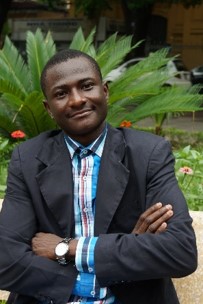“Nothing, nothing can replace training, nor talent, nor genius.”
Hello, who are you?
Welcome to my little world. I am Nacambo Idrissa. I am born on a very rainy day in Burkina Faso, in a poor household, and from what my elders told me, I was born at the end of 21 days of drought. I grew up in hard conditions but my parents raised me with strong values of integrity, justice and most of all, excellence in work. I heard about CDAIS through FERT, a French association working on rural development, in which I remain responsible for economic and associative activities. Fert and CDAIS have a common approach that motivates me: an approach based on co-construction and self-responsibility. The producer is at the heart of the approach and of decision making. I particularly appreciate the functional capacities’ approach of CDAIS.
What are your roles and responsibilities as National Innovation Facilitator?
I am an innovation facilitator for the farmer advisory services innovation partnership. I live in Koya, a small place burnt by the sun, over 100 km from Ouagadougou. My role is to facilitate participatory multi-stakeholder workshops, to conduct a capacity needs assessments, to elaborate an action plan, and to follow the implementation of this action plan. I also support the organization of events that requires the participation of stakeholders form the partnership.
What has CDAIS changed for you?
CDAIS helped me to step back from my previous professional experience and to gain new skills, knowledges and attitudes. I have been trained to be a good innovation facilitator and on the importance of soft skills for the facilitation of a multi-stakeholder partnership. Each workshop is an opportunity to learn and meet inspiring people. CDAIS made me realize that offering an isolated and technical answer to a specific problem was not always enough. To be effective, our approaches should be systemic. As an example, the answer to teach illiterate producers how to read is quickly limited, as the producers would then find new responsibilities at municipality level and would leave the group with the same initial problem. The systemic approach would analyse an issue in a holistic way and see the links with other parts of the system. I use my experience with CDAIS with producers on the field. I experiment the ‘reasoned vote’ approach for prioritization of action plan activities for the producers from Niébé that I coach.

